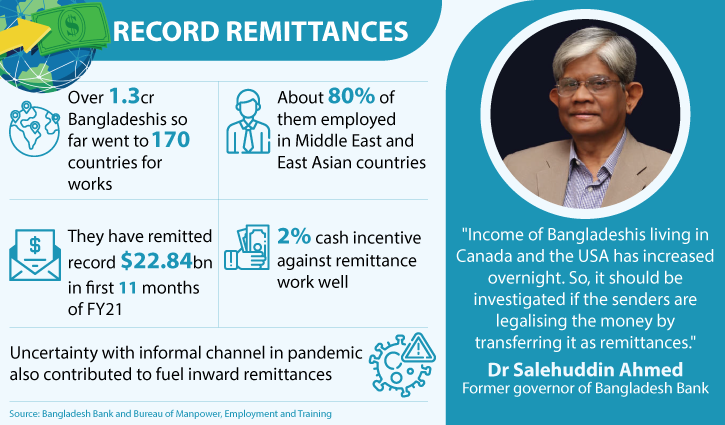Remittance saves Bangladesh economy in pandemic year
Md Owasim Uddin Bhuyan || BusinessInsider

Record remittances
Bangladesh’s inward remittances reached all-time high in the outgoing year amid a speculation that the inflow of money from abroad would be hit hard because of the Covid-19 pandemic.
The country fetched $ 22.84 billion in the last 11 months in remittances, according to Bangladesh Bank statistics. Experts are projecting the total remittances to be around $ 25 billion at the end of this fiscal year.
The sum is equivalent to Tk 212,500 crore, which is higher than the country’s total development budget allocated for the expiring fiscal year. Bangladesh can build more than four Padma Bridges with this fund.
Indeed, this strong inward flow of remittance, sent by the millions of expatriates, has played a key role to protect the nation, especially the rural economy during this extremely challenging time, officials said.
Economists and migration experts said there was an unexpected rise in remittance during the Covid-19 period owing to several factors.
They said that a big chunk of the amount accompanied the workers who came home during the pandemic.
The government’s move to provide 2 percent incentive to the beneficiaries to discourage illegal ‘hundi’ (informal way of transferring money) has worked well, they said.
Some experts believe expatriates remitted the money generously thinking their families were facing financial hardship because of Covid-19 fallout.
“The workers sent a maximum amount of money back home to support their family members as Covid-19 had affected their incomes,” said Bangladesh Bank’s former governor Dr Salahuddin Ahmed.
Expatriate Bangladeshis have transferred their money through formal channels fearing uncertain delivery through non-formal channels during this time of economic hardship, he explained.
Ahmed, also a noted economist, found that there was an unusual rise in remittance flow from North American countries including USA and Canada. He advised the government to probe into the matter.
“Income of Bangladeshis living in Canada and the USA has increased overnight. So, it should be investigated if the senders are legalising the money by transferring it as remittances,” he said.
According to the Bureau of Manpower, Employment and Training (BMET), over 13 million Bangladeshi migrants are currently working in 170 countries.
About 80 per cent of them are employed in the Middle East and East Asian countries, the BMET officials said.
Those short-time migrant workers employed in ME and EA countries are sending the lion’s share of the remittances to Bangladesh, they said.
Bangladesh Civil Society for Migration (BCSM) co-chair Syed Saiful Haque told Business Insider Bangladesh that the government should take effective measures to protect the interests of the expatriates who have been the prime contributors to the national economy.
The provident fund and pension scheme that were proposed by the expatriates’ welfare and overseas employment ministry should be approved by the finance ministry for Bangladesh’s workers abroad, Saiful said.
Saiful, also a migration expert, proposed enlisting the home coming migrants in all districts and asking them to open businesses in their respective hometowns.
“The arriving migrants and diaspora Bangladeshi should be engaged in business enterprises to utilize their skills and expertise,” he added.
Over five lakh Bangladeshi workers have returned home since April 2020, according to officials of Wage Earners Welfare Board.
The spread of Covid-19 has affected the jobs of the out-bound workers in the host countries and that they are being forced to return home, they said.
Meanwhile, a World Bank report recently said Bangladesh’s economy has been showing some nascent signs of recovery backed by rebounding exports and strong remittance inflows.
The new World Bank report on ‘Bangladesh Development Update- Moving Forward: Connectivity and Logistics to strengthen Competitiveness,’ said that after being severely affected by the Covid-19 pandemic, the economy of Bangladesh was now recovering gradually. The spread of Coronavirus forced Bangladesh’s economy to get slower for the first time in two decades.
























